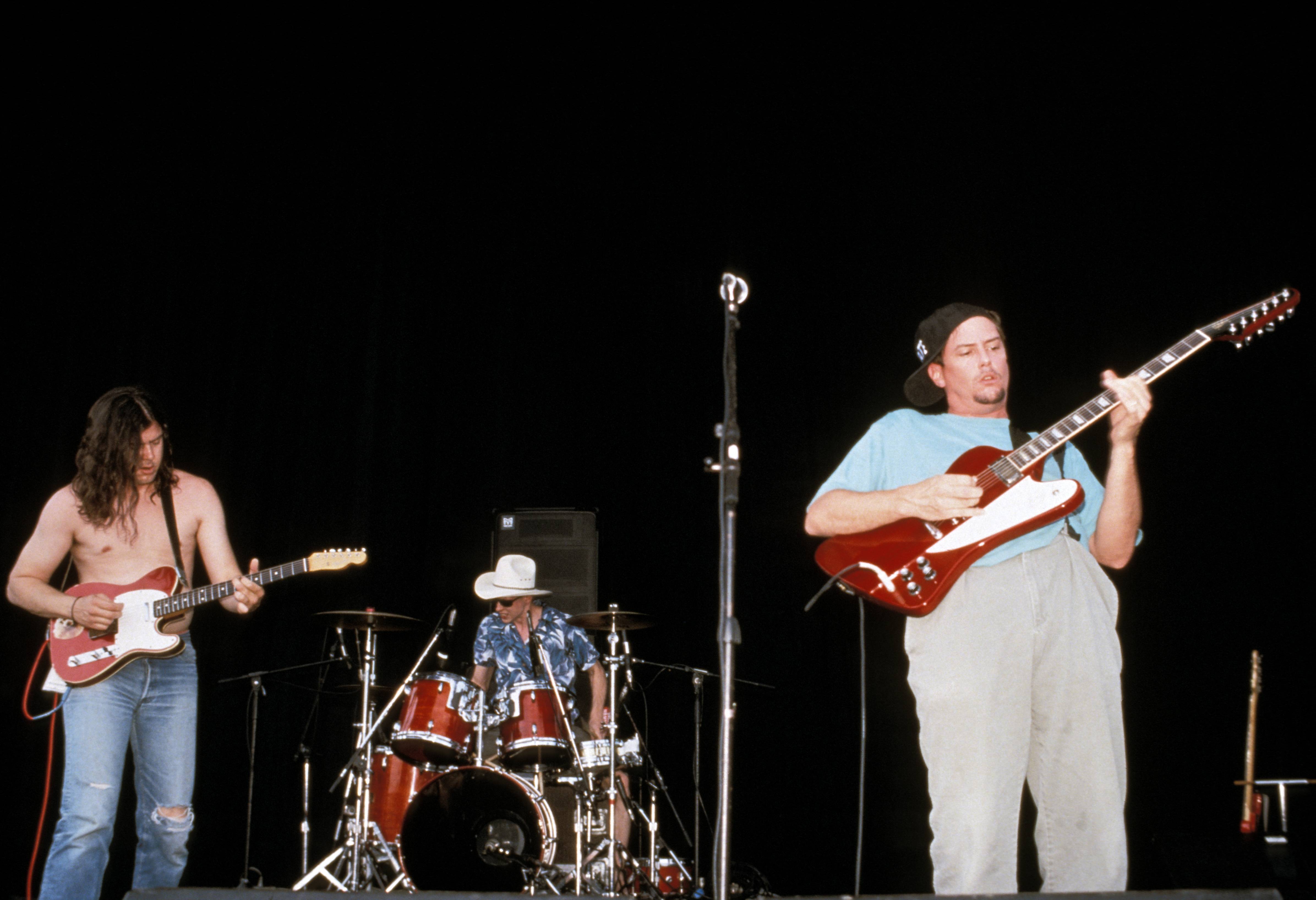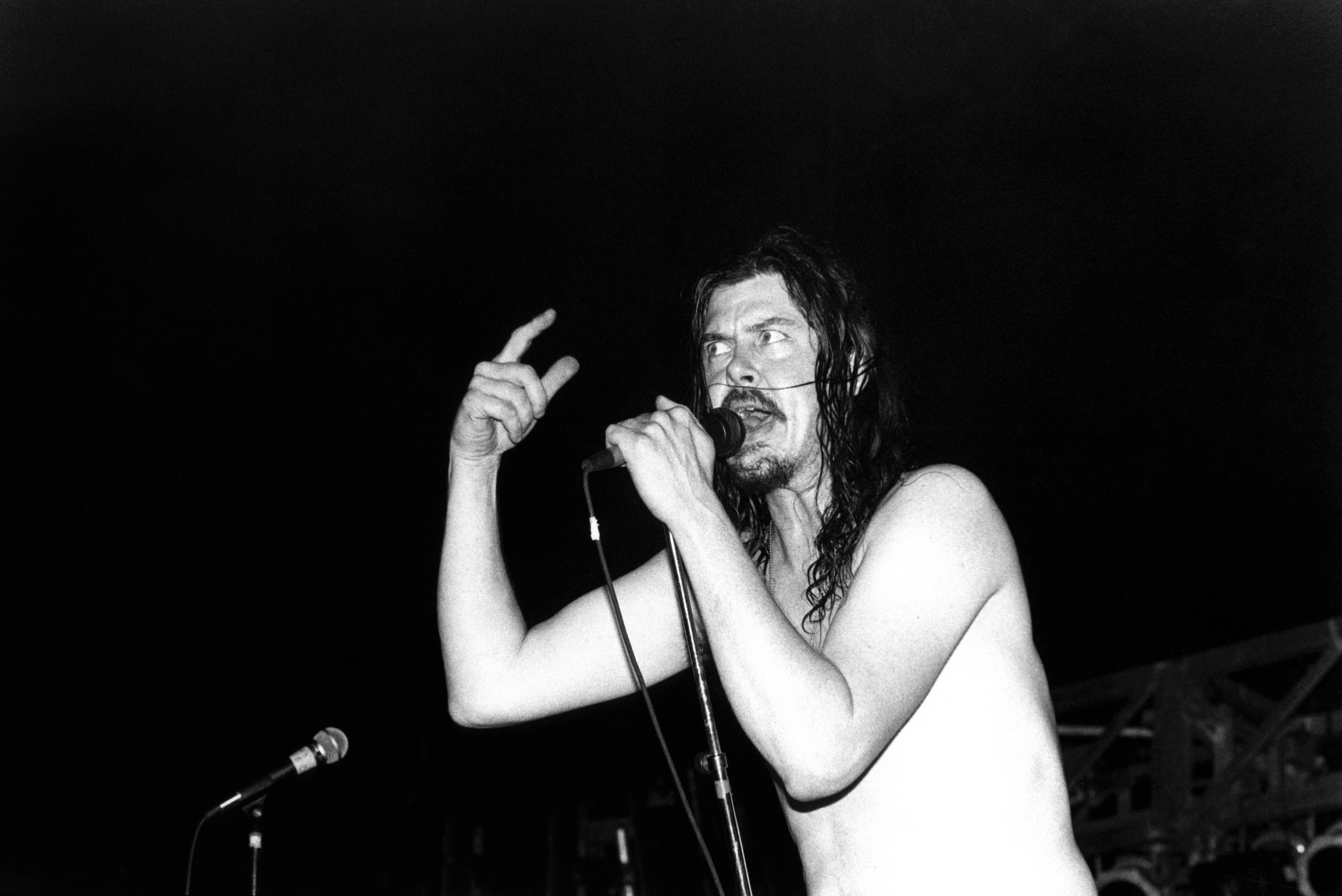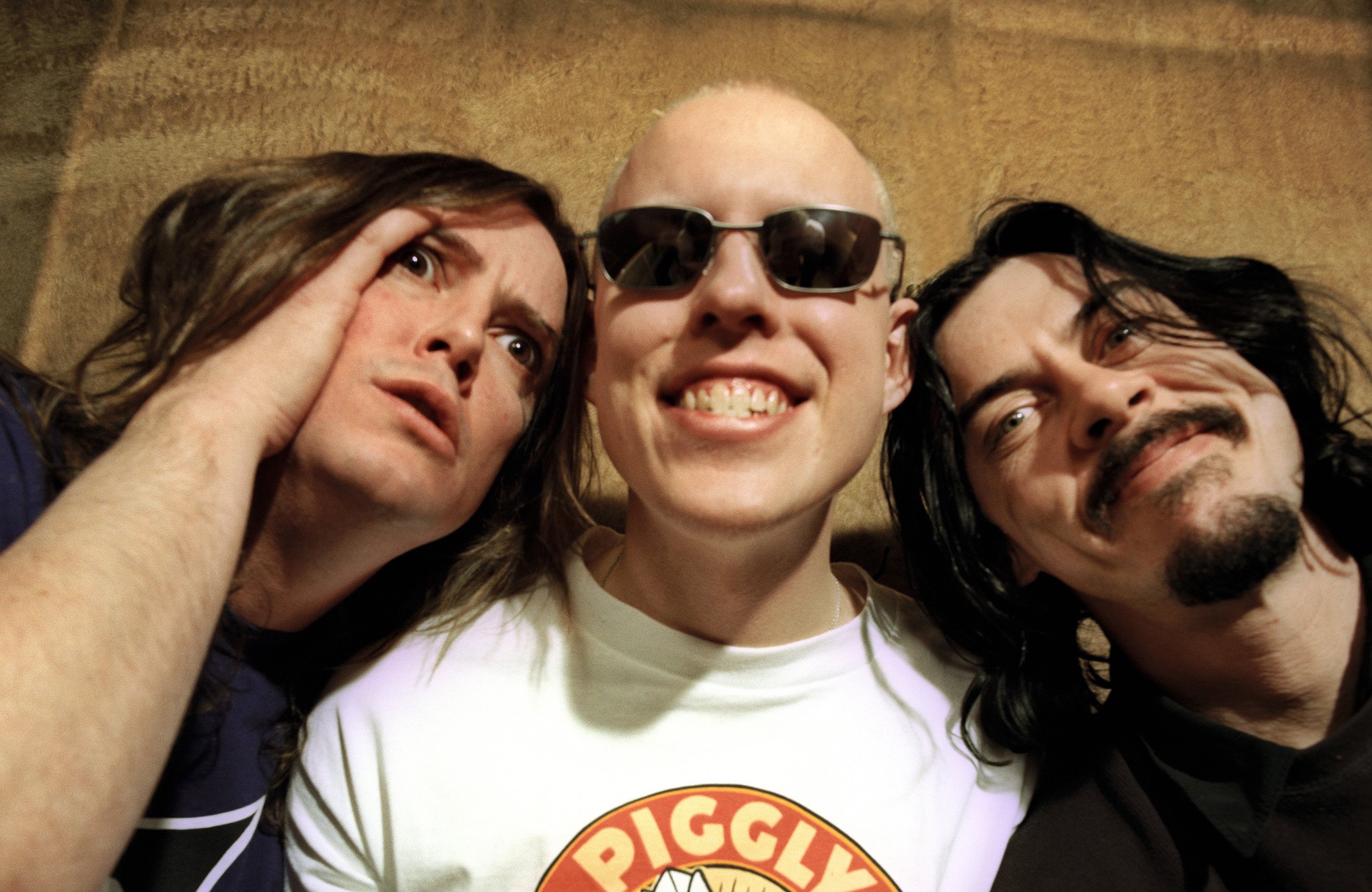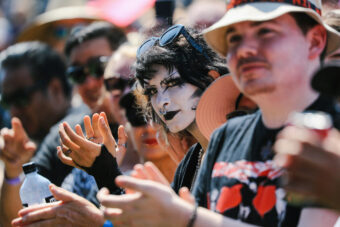This article originally appeared in the June 1993 issue of SPIN.
Retired Fish and Wildlife employee Jim Hewkins stands in a small clearing in the woods somewhere outside of Portland, Oregon. Streamers of midday sun drape themselves from the branches of the tall pines surrounding our small group of less-than-reputable-looking nature lovers, as Hewkins delivers a short lecture and answers questions.
Bigfoot, Hewkins tells us, is at the top of the food chain, with the authority of a man who’s been investigating the subject since the early ’70s, and a member of the International Society of Cryptozoologist. His strides are twice as long as an average man’s, he can claw apart a tree stump effortlessly, make vertical leaps that would shame Michael Jordan, eat anything, sleep anywhere, and may be lurking just around the corner.
Yeah, right. Next thing, you’ll be telling me that the Butthole Surfers signed to a major label and got some guy from Led Zeppelin to produce their record. Nevertheless, Hewkins’ levelheaded demeanor and low-key certainty are pretty convincing; he has investigated more than a dozen incidents in this general area in the past several years, and while unable to come up (yet) with actual, concrete proof (say, a corpse), has obviously seen enough to convince himself.
His explanations for the elusiveness of his quarry are credible, and he dismisses with a smirk some of the more outlandish claims made on behalf of Sasquatch (you know, that he’s of alien origin, that he disappears in a flash of light when you shoot him, that he’s the guitarist for Soundgarden.) About the only thing that seems to have Hewkin stumped, in fact, is what the hell the Butthole Surfers are doing here.

We climb hills, we slide down snowy slopes, we clamber with our four-wheel drives up logging trails, we have lame snowball fights, we consider (and decide against) running around naked for the benefit of the photographer, we worry about whether, as rumored, members of Ministry have followed us up here and are preparing to jump out from behind trees and scare us. We who are not driving drink several beers and, you know, loosen up. At some point, Gibby Haynes builds a snow dick.
We discuss, in this appropriately goofy backdrop, the long and illustrious career of one of the country’s finest rock combos. We decide that our suit, Hewkin, is, in guitarist Paul Leary’s words, “way too cool to be hanging out with us.” But we do not, to our bravely concealed disappointment (hey, but I could tell), fund hide nor hair of no damn Bigfoot.
Returning to our Jeeps after one hiking excursion, Hewkin, who at our prompting has downed a beer or two and is thus, you know, loosened up (to the point where he’s begun relating some of the more disgusting Bigfoot sighting stories, pertaining to the crypto-beast’s defamatory etiquette), has stopped trying to understand what we’re doing here and begun to enjoy himself. He sidles up alongside Haynes. “So, uh, are you guys surfers?” he asks.
* * *
These days, things seem to be going well for the Butthole Surfers. Time was, the band’s name alone would seem to eliminate the possibility of any sort of mainstream viability, and even today there are newspapers who won’t print the name in full (“BH Surfers” seems to be the most popular bowdlerization). Perhaps Paul Leary puts it best: “I knew when I heard someone say ‘stick it up your butt’ on Major Dad that the Butthole Surfers’ day was near.”
From its humble beginnings in August in 1981 (Leary and Haynes are the only two original members, although drummer King Coffee has been a member since ’82; bassist Jeff Pinkus hopped on board in ’86), the band was forged by means of a nearly inhuman appetite for touring and a slew of well-received independent releases. The band’s first record, on Jello Biafra’s Alternative Tentacles label, remains a punk-rock classic, and 1987’s Touch and Go release, Locust Abortion Technicians, explored ’70s-style rifferama way before anyone from Seattle could find his or her way to the thrift store.
The pseudotribal rite that passed for a Buttholes live show, especially in the band’s wild, earlier days—combining nude go-go dancing, gross-out film backdrops, body painting, dual drummers, strobe lights, smoke effects, Haynes setting himself and the cymbals on fire by pouring and igniting lighter fluid with something less than a careful regard for the laws of physics—went a large way toward cementing the band’s reputation. It’s participation in the first Lollapalooza festival helped expose the Buttholes to a larger audience, which apparently contained a few attentive record-label people as well, resulting in the most improbably of developments: the Butthole Surfers on Capitol Records being produced by John Paul Jones.
The new record, Independent Worm Saloon, is probably the band’s strongest yet. Jones’s production emphasizes the tighter, rocker side of the Buttholes’ and de-emphasizes the trippy, stoner, wig-out aspects—in my book, a righteous step forward. Check out, especially, “Goofy’s Concern,” a vitriolic blast of near-Stooges punk-rock blather, whose opening lines (“I don’t give a fuck about the CIA / I don’t give a fuck about the FBI”) recall the nihilistic splendor of the Sex Pistols‘ “Anarchy in the U.K.” Worm Saloon is certainly, despite its fearsome length (17 songs, 64 minutes), the most coherent thing the band has done, and should help the Buttholes capitalize on that wider audience thing that major-label distribution is supposed to afford.
* * *
“John fuckin’ Paul Jones.” The words explode out of Paul Leary’s mouth. Leary talks in torrents, words tumbling over each other in a rush to get past the native Texan’s tongue. “We were in the process of trying to pick producers that were interested. And it was gonna be really tough to pick one and tell the others, ‘Hey, sorry, but I picked this guy instead,’ and then somebody at Capitol suggested we try John Paul Jones. And when they suggested it to us, we just cracked up laughing. Oh yeah, right, John Paul Jones is going to rush over here and produce our record. Then Capitol sent him our demo tape. He said he’d do it—so that made it real easy to tell all those other producers, ‘Hey, we’re not gonna pick you, we got John Paul Jones.’ Everybody was like, ‘Oh well, of course, I would have done the same thing.'”
“It’s kind of like if Pontius Pilate told you that Jesus Christ was interested in producing your record,” adds King Coffey. Coffey, a tall, pale, blond stick figure (he jokes about himself as “Skinnyfoot”), rarely speaks, but when he does, it’s always interesting. “I guess they’d know it’s Jesus Christ, y’know?”

“I was walking down the street,” says Leary, “and this little kid chased me and goes, ‘Aren’t you Paul from the Butthole Surfers?’ And he goes, ‘Hey man, I read in the [Austin] Chronicle that John Paul Jones was going to produce your record.’ And I go, ‘He was the bass player for Led Zeppelin.’ And he goes, ‘Oh man, I thought it was the Pope.’ And he, like, walked off disappointed.”
“So what was he like to work with?” I ask.
“He demanded that things be 80 percent finished by the time we went in there,” says Jeff Pinkus, in a comfortable drawl. “And he had some ideas when we’d get a little too repetitive with certain things. And helped us out with some of the arrangements.”
“Did John Paul talk much about Led Zeppelin?” I ask, in a craven and blatant attempt to ferret our sensational gossip.
“He’s still obviously really moved by the death of John Bonham,” replies Leary. “I mean, after a few scotches he’d still get, like, real pissed off and upset about it and it was just, like, ‘That really changed me.’ It’s real sad, ’cause he really loved that guy, you could tell. I mean, he talked about John Bonham so much more than anybody. It was like that was his entertainment in life, that guy.”
“Did Lollapalooza help you guys get signed?” I ask. “I mean, did it create more interest than otherwise might have been the case?”
“It almost killed our deal because we said, ‘Man, we’re not gonna negotiate till we get back,'” says Leary. “We’ve got this big tour to think about. And then [Capitol] got confused. At the era end of the tour they started to get cold feet ’cause they thought we were dissing them, ’cause we weren’t negotiating.”
“They thought we were trying to sue other labels to drive their offer up,” adds Haynes.
“Which you were,” I offer.
“Of course! It’s the American way,” confirms Haynes gleefully.
“American as apple pie,” adds Leary.
* * *
Sitting around in the bar of some really nice hotel in Portland (we had heard a rumor that Bigfoot hangs out there, and we wanted our search to be thorough), drinking the fine, turkey product of some local microbrewery, the talk naturally turns to ye olde punk-rock days.
Things—genuinely strange things—have always seemed to just sort of happen to the Butthole Surfers, although a fair case can be made that some of these things the band brings upon itself. Just last night, for example, Haynes got himself thrown out of this same hotel for allegedly staring at two girls and making them cry, although he insists he didn’t do it (although in truth he can’t remember too much of what he did do).
We never found Bigfoot—but one of the Jeeps ran out of gas and we got to push it several miles with the Jeep containing the smarter, better prepared expedition members (the one I was in). We each carried out hunting trophies—well, actually we didn’t have any hunting trophies, and, like I said, we didn’t find Bigfoot (not hide, not hair).
But when we did stop at the nearest gas station, I came away with a microwaved individual pizza, a can of sour-cream-and-onion-flavored Pringles, and one of those Slim Jim cheese and beefsteak combos, which, while I did not actually search and destroy any of it myself, nevertheless won me near-universal disgust among my traveling companions. For that alone, I would have to consider our mission a success.





